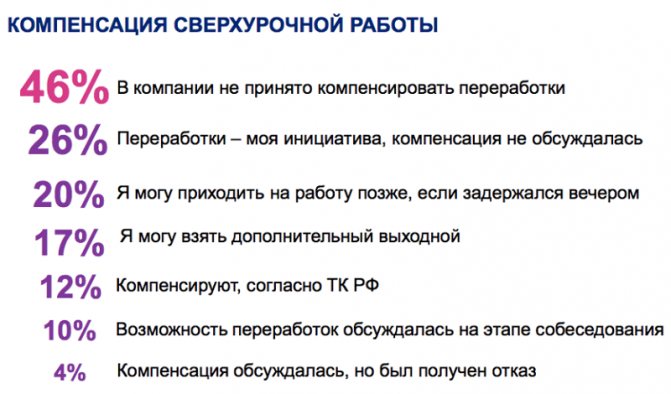Article 419 of the Labor Code of the Russian Federation states that persons guilty of violating labor legislation and other acts containing labor law norms are held accountable in the manner established by the Labor Code and other federal laws. There are different types of liability: material, disciplinary, administrative and even criminal.
Let's consider what threatens violators.
Read on topic:
When can a company be punished for refusing employment?
Disciplinary responsibility
There are three types of disciplinary liability for employees - reprimand, reprimand and dismissal. In relation to officials, the variety of disciplinary measures can be expanded. For example, an official may be involuntarily suspended from duty for a specific period of time.
Bringing to disciplinary liability the head of the organization, the head of the structural unit of the organization, their deputies at the request of the representative body of employees is provided for in Article 195 of the Labor Code of the Russian Federation. If the fact of violation is confirmed, the employer is obliged to take disciplinary action against officials.
Work without a contract
This applies to those entrepreneurs who hire employees without drawing up an employment contract or contract. Unfortunately, this practice is still common. This is especially true for novice entrepreneurs, for whom every penny counts. If you hire at least one employee, you will need to pay taxes, pensions and insurance contributions for him... And if you periodically attract remote workers (programmer, designer, copywriter and others) - you also need to conclude a civil contract or a contract with them . In addition, the contract must indicate the employee’s working conditions, and a second copy must be handed over to the person.
Does everyone do this, tell me honestly? It’s expensive and tedious, but it’s necessary, and there’s nothing you can do about it.
What are we risking?
An offended employee can contact the labor inspectorate or complain to the tax office. And hello, checks and fines! Failure to formalize an employment or civil law contract or its incorrect execution is punishable by an administrative fine. Officials will pay from 10 to 20 thousand rubles, legal entities will be unlucky - the fine ranges from 50 to 100 thousand.
Material liability
Labor legislation also provides for the financial liability of the employer.
Delay in payment of wages and other payments.
The employer is obliged to pay them with interest (monetary compensation) in the amount of not less than 1/150 of the current key rate of the Central Bank of the Russian Federation of unpaid amounts for each day of delay (Article 236 of the Labor Code of the Russian Federation). The amount of monetary compensation paid to an employee may be increased by a collective agreement or employment contract. The obligation to pay the specified monetary compensation arises regardless of the employer’s fault.
Moral damage caused to an employee by unlawful actions or inaction of the employer.
The amount of damage is compensated to the employee in cash in the amounts determined by agreement of the parties to the employment contract (Article 237 of the Labor Code of the Russian Federation), and in the event of a dispute, by the court, regardless of the property damage subject to compensation.
Illegal deprivation of an employee’s opportunity to work (Article 234 of the Labor Code of the Russian Federation).
Such cases include:
- illegal removal of an employee from work, his dismissal or transfer to another job (Articles 72, 73, 76, 394 of the Labor Code of the Russian Federation);
- the employer’s refusal to comply with the decision of the labor dispute resolution body or labor inspector to reinstate the employee to his previous job (Article 396 of the Labor Code of the Russian Federation);
- delay by the employer in issuing a work book to an employee, entering into the work book an incorrect or non-compliant formulation of the reason for dismissal of the employee (Article 84.1, 394 of the Labor Code of the Russian Federation).
In such cases, the employer is obliged to compensate the employee for unearned earnings (Article 234 of the Labor Code of the Russian Federation).
Time tracking
The Labor Inspectorate monitors how companies take into account the working time of employees (Article of the Labor Code of the Russian Federation). Those who do not keep such records at all (decision of the Perm Regional Court dated September 4, 2019 in case No. 7-1856/2019/21-1065/2019) and those who organized them incorrectly or do not keep them in accordance with the established forms risk receiving a fine. .
Thus, a company from Chita and its manager (decisions of the Trans-Baikal Regional Court dated 02/04/2019 in case No. 7-21-46/2019 and in case No. 7-21-44/2019) were fined due to the fact that the form of the worker’s report card time did not correspond to the official one (Decree of the State Statistics Committee of January 5, 2004 No. 1). And the capital company was punished for the fact that data on the driver’s actual time was not indicated in his waybills (decision of the Moscow City Court dated July 18, 2019 No. 7-7127/2019, 7-7207/2019, 7-7210/2019, 7-7126 /2019, 7-7154/2019).
Keep your timesheet and calculate your salary in one window
Administrative responsibility
In case of violation of current labor legislation, administrative penalties may be imposed on the following persons:
- organizations, namely the heads of various companies, regardless of their legal form.
- officials - heads of structural divisions;
- individual entrepreneurs hiring employees.
- The administrative measures applied provide for the following sanctions:
- monetary fines (the amount depends on the specific type of violation);
- disqualification of an official for a certain period of time;
- suspension of the activities of the entire organization (the maximum duration of the period should not exceed 90 days).
Basically, violations of labor legislation are detected by state labor inspectors or other state and municipal control bodies. Regulatory authorities do not always immediately impose a fine: they can issue a mandatory order to eliminate violations. If the employer does not comply with such an order, then it is already possible to apply administrative liability measures under Part 1, Art. 23 Code of Administrative Offenses of the Russian Federation.
Read on topic:
A new reason for an unscheduled inspection
What does the Labor Inspectorate check?
An employer is found guilty of committing an administrative offense if it is revealed that he had the opportunity to comply with the rules and regulations, but he did not take all measures within his power to comply with them.
Administrative punishment for violation of labor legislation may follow within a year from the date of commission of the administrative offense (Article 4.5 of the Code of Administrative Offenses of the Russian Federation).
Briefing and medical examinations
A fine of 50 thousand rubles can await both those who neglect medical examinations and those who do not follow the necessary formalities (Part 1 of Article 5.27 of the Code of Administrative Offenses of the Russian Federation).
For example, an employer was fined for allowing drivers to work without pre-trip medical examinations (decision of the Moscow City Court dated July 18, 2019 No. 7-7127/2019, 7-7207/2019, 7-7210/2019, 7-7126/2019, 7- 7154/2019). By the same decision, the Moscow City Court found it lawful to impose a fine on the company for the fact that it had carelessly prepared logs about employees undergoing initial training. In particular, she did not enter data on the date of admission of the employee to independent work and the internship period.
Refusal to hire
Anyone has the right to look for work and find it. Relax - not every person on the street can be rejected for work. We are talking only about an unreasonable refusal - for example, if the candidate meets your requirements, but you personally did not like it. Or a girl came - an excellent specialist, smart, but pregnant - which means she won’t work for long. Even advertisements “wanting an employee no older than 40 years old” are already age discrimination. Now there are fewer and fewer of them - people have learned to defend their rights.
As stated in Article 64 of the Labor Code of the Russian Federation, an unreasonable refusal is one without specifying a reason at all, for personal reasons that have nothing to do with the business qualities of the applicant, or on the basis of gender or age (discrimination of an employee).
What should an employer do in such a situation? We all understand perfectly well that a girl on maternity leave really won’t work much, and a person who makes a bad impression from the first meeting is unlikely to fit into the team. This means that it is necessary to introduce clear selection criteria - interviews, testing of employees, possession of professional knowledge and skills.
What are we risking?
A lawsuit. A rejected candidate can appeal to the labor inspectorate or court. Also, for an unreasonable refusal of a pregnant woman or someone who has a child under three years of age (if the boss has not explained an objective reason), criminal liability may arise under Article 145 of the Criminal Code of the Russian Federation. The fine will be up to 200 thousand rubles or compulsory work.
Working overtime without compensation
A familiar situation - you ask a manager to work on a day off because the season is at its peak, there are a lot of orders, and you don’t want to lose profit? The manager agrees, cancels plans and works on his day off - but does he receive compensation for this?
The Labor Code states that you need to work no more than 40 hours a week. Anything above that is already recycled. In addition, the employee needs to be asked if he agrees, and not presented with a fait accompli, and even under the threat of dismissal (we’ll talk about this a little later). For overtime work, the business owner must pay increased compensation or give the employee a day off. The increased size is also clearly recorded in the TC. From July 1, 2021, compensation for weekends and holidays spent at work is paid at double the rate. If an employee worked only a few hours, it means that these hours will cost the employer 2 times more.
Let's talk separately about irregular working hours. All these advertisements with the conditions of “irregular working hours” are mostly illegal, because it is unlikely that employees receive all the necessary compensation. Irregular working hours turn into plowing from 8 am to 10 pm, and so on every day. Meanwhile, according to the new amendments, an irregular schedule is introduced only if the employee works full time - and the work week must be incomplete. That is, you worked 14 hours a day - then rest, dear. And this does not apply to those employees who work part-time.
What are we risking?
This violation relates to the same article of the Code of Administrative Offenses as the previous one. Accordingly, the fines will be the same. There are no criminal penalties, thank God.

Violation of the terms of an employment contract by an employee
According to the employment contract, the employee undertakes to perform the labor function defined by this contract, as well as strictly follow the internal labor regulations that apply to this employer.
The following actions may lead to termination of the employment contract and dismissal of the employee:
- Refusal by an employee to perform his job duties (repeatedly) and receiving disciplinary sanctions.
- Gross violations of labor duties:
- absenteeism
- appearing at the workplace in a state of toxic intoxication (alcohol, drugs or other)
- disclosure of secrets (official, state, commercial) that became known to the employee during his work activity
- disclosure of personal data of other employees
- intentional theft of someone else's property, its embezzlement, destruction or damage
- violation of labor safety rules, which led to an accident, catastrophe or breakdown (or became a threat of these consequences).
- Violation of the rules of the enterprise when servicing commodity or monetary assets, which gave grounds for loss of trust of the employer.
- Amoral behavior.
- Providing false information and forged documents to conclude an employment contract.
Legal assistance on employment contracts
Consultation in the office and by phone
+7(495) 728-99-14
Help from a lawyer. 18 years of experience under an employment contract!
We are working during the quarantine period of 2021! Call.








